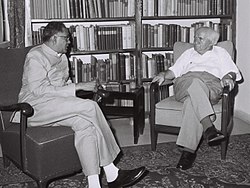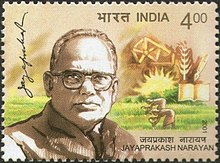Jayaprakash Narayan
Jayaprakash Narayan | |
|---|---|
JP Movement | |
| Spouse | Prabhavati Devi |
| Relatives | Brajkishore Prasad (father-in-law) |
| Awards | (1999) (posthumously) |
Jayaprakash Narayan Srivastava (
Early life
Jayprakash Narayan Srivastava was born on 11 October 1902
Narayan came from a
In October 1918, Narayan married Braj Kishore Prasad's elder daughter and freedom fighter
Higher education in the United States
After exhausting the courses at the Vidyapeeth, Narayan decided to continue his studies in the United States.[10] At age 20, Jayaprakash sailed aboard the cargo ship Janus while Prabhavati remained at Sabarmati. Jayaprakash reached California on 8 October 1922 and was admitted to University of California, Berkeley (UC Berkeley) in January 1923.[12] To pay for his education, Narayan picked grapes, packed fruits at a canning factory, washed dishes, and worked as a garage mechanic and at a slaughterhouse, sold lotions and taught. These jobs gave Narayan an insight into the difficulties of the working class.[1][2]
After a semester studying chemistry
In Wisconsin, Narayan was introduced to
Politics

Having become a Marxist, Narayan returned from the US to India in late 1929.[17] The same year, he joined the Indian National Congress (INC or Congress) on the invitation of Jawaharlal Nehru; Mahatma Gandhi became Narayan's mentor in the Congress. Narayan shared a house at Kadam Kuan in Patna with his close friend and nationalist Ganga Sharan Singh (Sinha)[18] with whom he shared a lasting friendship.[18]
After being jailed in 1930 for
When Mahatma Gandhi launched the
After Independence
Between 1947 and 1953, Jayaprakash Narayan was President of All India Railwaymen's Federation, the largest labour union in Indian Railways.[22]
Emergency
In 1975,
Jayaprakash Narayan gathered a crowd of 100,000 people at
Narayan was detained at Chandigarh; he asked for one month parole to mobilise relief in flooded parts of Bihar. His health suddenly deteriorated on 24 October 1975, and he was released on 12 November the same year.[citation needed] At Jaslok Hospital, Bombay, Narayan was diagnosed with kidney failure; he would be on kidney dialysis for the rest of his life.[citation needed]
In the UK,
On 18 January 1977, Indira Gandhi revoked the emergency and announced elections. The Janata Party, a vehicle for the broad spectrum of the opposition to Gandhi, was formed under JP's guidance.[citation needed] The Janata Party was voted into power and became the first non-Congress party to form a central government.[25] In the 1977 Indian presidential election, Narayan was proposed as President of India by Janata Party leaders but he refused and Neelam Sanjiva Reddy, then Speaker of the Lok Sabha, became President.[citation needed]
Private life
At the age of 17, Jayaprakash was married to Prabhavati Devi, daughter of lawyer and nationalist Brij Kishore Prasad in October 1919. Prabhavati was very independent and on Gandhi's invitation, went to stay at his ashram while Jayaprakash continued his studies.[26] Prabhavati Devi died on 15 April 1973 after a long battle with cancer.[citation needed]
Death
In March 1979, while he was in hospital, Narayan's death was
Awards

- Bharat Ratna, 1999 (Posthumous) for Public Affairs: It is India's highest civilian award.[29]
- Rashtrabhushan Award of FIE Foundation, Ichalkaranji[26]
- Ramon Magsaysay Award, 1965 for Public Service.
Sites named after Jayaprakash Narayan

- Jay Prakash Narayan Airport in Patna
- On 1 August 2015, the Chhapra-Delhi-Chhapra Weekly Express was renamed as Loknayak Express in his honour.[30]
- Ganga in Bihar
- Jayaprakash Nagar (JP Nagar) a residential area in Bangalore.
- Jayaprakash Nagar (JP Nagar) a residential area in Mysore.
- Lok Nayak Hospital (hospital in New Delhi
- Lok Nayak Jayaprakash Narayan National Institute of Criminology & Forensic Science (college in New Delhi)
Artistic depictions of JP
- Prakash Jha directed a 112-minute film "Loknayak", based on the life of Jaya Prakash Narayan (JP).[31][32] Chetan Pandit played the role of JP in that film.[33]
- Pradhanmantri (TV Series)and Aaj Tak Aandolan.
See also
Footnotes
References
- ^ a b c "The Idea of 'Total Revolution'". Bangalore Mirror. 16 October 2015. Retrieved 22 February 2021.
- ^ a b c Khushwant Singh (30 March 1975). "A new wave from the old India". The New York Times. Retrieved 22 February 2021.
- ISBN 978-81-7625-734-3.
- ^ ISBN 978-81-7220-157-9. Retrieved 5 June 2023.
asked him whether Narayan was his surname. He said no and said that he was in fact Jayaprakash Narayan Srivastava. Jayaprakash Narayan is his name and Srivastava is his surname. Conversations centered on the community of Kayasthas
- ISBN 978-0-19-561204-2.
- ^ "A forgotten hero's forgotten legacy". Archived from the original on 16 August 2017.
- ISBN 978-81-8324-001-7.
- ISBN 978-81-250-1021-0.
- ISBN 9780836401158.
- ^ ISBN 978-81-8324-001-7.
- ISBN 978-81-7625-734-3.
- ^ Chishti, Seema (11 October 2017). "Jayaprakash Narayan: Reluctant messiah of a turbulent time". The India Express. Retrieved 11 June 2018.
- .
- ^ Narayan, JP. Cultural variation. Diss. The Ohio State University, 1929.
- ^ "Writings of Jayprakash Narayan". www.mkgandhi.org. Retrieved 21 January 2021.
- ^ S, Lekshmi Priya (4 August 2018). "This Unsung Kerala Scholar Was The Architect of the Quit India Movement in Malabar!". The Better India. Retrieved 18 February 2024.
- ISBN 978-81-8324-001-7.
- ^ ISBN 978-81-7488-865-5.
- ^ a b Srivastava, N.M.P. (1988). Struggle for Freedom: Some Great Indian Revolutionaries. K.P.Jayaswal Research Institute, Government of Bihar, Patna.
- ^ Distance between Hazaribagh Central Jail and Gaya. Maps.google.co.in. Retrieved on 20 November 2018.
- ^ "Bihar Vibhuti's Legacy Drifting into Oblivion?". Patna Daily. 6 January 2012. Archived from the original on 25 January 2012. Retrieved 6 January 2012.
- ISBN 9780231140027.
- ^ Harish Khare (16 May 2001). "Obligations of a lameduck". The Hindu. Archived from the original on 20 July 2009. Retrieved 2 January 2009.
{{cite news}}: CS1 maint: unfit URL (link) - ^ McRobie, George (30 June 2003). "Surur Hoda: Trade unionist who spread the message of Mahatma Gandhi". The Guardian. London. Archived from the original on 27 August 2013. Retrieved 6 January 2012.
- ^ "How non-BJP, non-Congress governments in India have fared in the past". thenewsminute.com. 16 May 2019. Retrieved 26 December 2019.
- ^ a b Vaidya, Prem. "Jayaprakash Narayan – Keeper of India's Conscience". LiberalsIndia.com. Archived from the original on 5 February 2012. Retrieved 16 August 2012.
- ^ "Jayaprakash Narayan's death announced mistakenly". www.indianexpress.com. 23 March 2019. Retrieved 9 December 2019.
- ^ Datta-Ray, Sunanda K. "Inconvenient Prophet". India Today. Archived from the original on 31 January 2009. Retrieved 6 January 2012.[failed verification]
- ^ Correspondent, NDTV (24 January 2011). "List of all Bharat Ratna award winners". ndtv.com. Archived from the original on 11 March 2013. Retrieved 29 November 2012.
- ^ "Blog Entry# 1555434". India Rail. 1 August 2015. Archived from the original on 18 October 2015. Retrieved 1 August 2015.
- ^ "Uncensored 'Loknayak' to be screened soon". The Times of India. 19 October 2004. Archived from the original on 8 February 2014. Retrieved 20 November 2018.
- ^ "Loknayak". Archived from the original on 22 February 2014. Retrieved 25 February 2021.
- ^ ""I am fully indebted to theatre"". The Hindu. 31 May 2010. Archived from the original on 22 February 2014. Retrieved 25 February 2021.
Further reading and bibliography
- Braja Kishore Prasad: The Hero of Many Battles by Sachidanand Sinha; National Book Trust, India, New Delhi; 2018; ISBN 978-81-237-8176-1
- Red Fugitive: Jayaprakash Narayan by H L Singh Dewans Publications Lahore 1946
- Life and Time of Jayaprakash Narayan by J S Bright Dewans Publications Lahore 1946
- J.P: His Biography, Allan and Wendy Scarfe, Orient Longmans New Delhi 1975
- Jayaprakash Narayan - Jankranti Ke Loknayak by Dr. Riteshwar Nath Tiwari, Rajmangal Prakashan, April 2023
- Jayaprakash: Rebel Extraordinary, by Lakshmi Narayan Lal, Indian Book Company New Delhi 1975
- Loknayak Jayaprakash Narayan, by Suresh Ram Macmillan Co. Delhi 1974
- Loknayak Jayaprakash Narayan by Farooq Argali Janata Pocket Books Delhi 1977.
- Bimal Prasad (editor). 1980. A Revolutionary's Quest: Selected Writings of Jayaprakash Narayan. Oxford University Press, ISBN 0-19-561204-3
- Jai Prakash Narain, Jayaprakash Narayan, Essential Writings, 1929–1979: A Centenary Volume, 1902–2002, Konark Publishers (2002) ISBN 81-220-0634-5
- Dr. Kawaljeet, J.P.'s Total Revolution and Humanism (Patna: Buddhiwadi Foundation, 2002). ISBN 81-86935-02-9
- Dr. Ramendra (editor), Jayaprakash Vichar Sankalan [Hindi] (Patna: Rajendra Prakashan, 1986).
- Satyabrata Rai Chowdhuri, Leftism in India: 1917–1947 (London and New Delhi: Palgrave Macmillan, 2008).
- Radhakanta Barik, Politics of the JP Movement (Radiant Publications, Delhi, 1977)
- MG Devashayam, JP Movement Emergency and India's Second Freedom (Vitasta Publishing Pvt. Ltd., New Delhi, 2012). ISBN 978-93-80828-61-9
- Why Socialism, 1936
- War Circulars, 1–4 CSP, Lucknow
- Inside Lahore Fort, Sahityalaya Patna 1947
- Nation Building in India – JP Narayan
- Three Basic Problems of India. From Socialism to Sarvodaya, Sarva Seva Sangh Prakashan, Varansi 1957
- A Plea for Reconstruction of Indian Polity, Sarva Seva Sangh Prakashan, Varansi 1959
- Swaraj for the People, Sarva Seva Sangh Prakashan, Varansi 1961
- Sarvodaya Answer to Chinese Aggression, Sarvodaya Prachuralaya Tanjore 1963
- Face to Face, Navchetna Prakashan, Varansi 1970
- Prison Diary, Samajwadi Yuvjan Sabha Calcutta 1976 and Popular Prakashan, Bombay 1977.
- Towards Struggle, edited by Yusuf Meherally, Padma Publications, Bombay 1946, 47
- Socialism, Sarvodaya and Democracy, edited by Bimal Prasad, Asia Publishing House Bombay 1964
- Communitarian Society and Panchayti Raj, edited by Brahmanand Navchetna Prakashan Varansi 1970
- Nation-Building in India, edited by Brahmanand Navchetna Prakashan Varansi 1974
- Towards Revolution, edited by Bhargava and Phadnis, Arnold-Heinemann New Delhi 1975
- J.P's Jail Life (A Collection of Personal Letters) translated by G S Bhargava, Arnold-Heinemann New Delhi 1977
- Towards Total Revolution, edited by Brahmanand Popular Prakashan Bombay 1978
- J P:Profile of a non-conformist, Interviews by Bhola Chatterji, Minerva Associates, Calcutta, 1979
- To All Fighters of Freedom II, A Revolutionary's Quest-selected writings of Jayprakash Narayan, edited by Bimal Prasad Oxford University Press New Delhi 1980
- Concept of Total Revolution: An Introductory Essay(JP and social change) by Bimal Prasad
